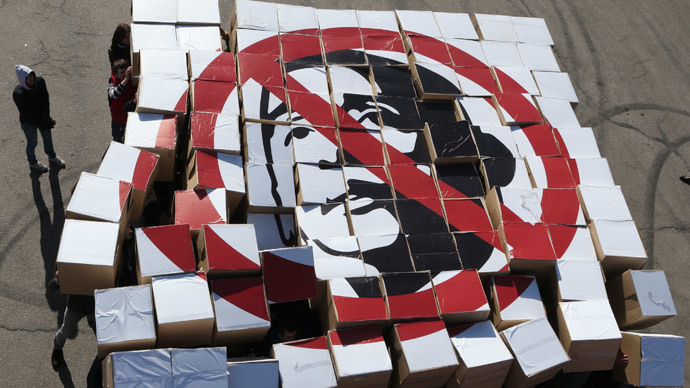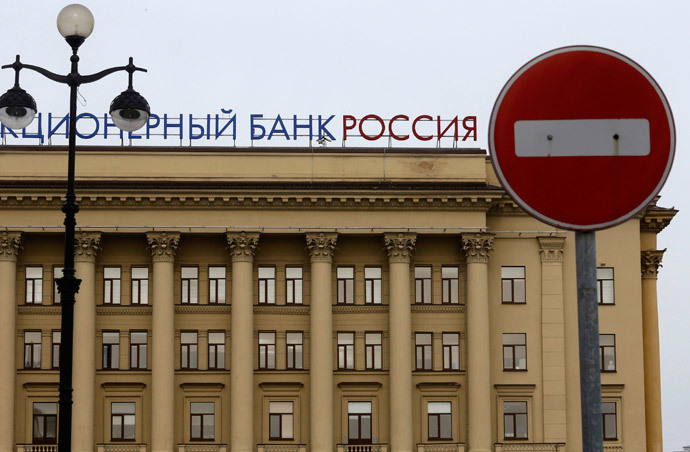Sanctioning Russia into multi-polar world?

US and European sanctions against Russia are designed to “punish” its actions in Crimea. However, instead of forcing Russia into economic and political submission, the sanctions will spur the country to greater political and economic independence.
Since the end of the Soviet Union, Russia’s economic progress and development has been directly dependent on political and economic institutions dominated by the West. From Russia’s integration into the World Trade Organization, to Russian dependence on Western banking and finance, Moscow has come to rely on precisely those institutions now being used against it. Naturally, any Russian countermeasures against the sanctions will aim to disentangle it from this US-, Anglo- and Euro-centric architecture, forcing Moscow to look elsewhere for its economic future. This need to find alternative modes of development and prosperity will contribute greatly toward the continuing shift to a multi-polar world.
Considering the vast sums of money and future investment at stake, it seems unlikely that there will be a monumental shift in the financial arrangement between Russia and the West, the current crisis notwithstanding. However, the recent actions taken by the US and its European partners underscore the need for Russia to consider viable alternatives to dependence on the West. This dependence takes many forms, from access to financing to revenue from energy exports – Russia heavily relies on Western capital to finance its budget and economic development.
The sanctions imposed by the West have not only targeted individuals determined to be in President Putin’s “inner circle,” but also major Russian banks (Bank Rossiya, Sobinbank, and SMP Bank). As a result, VISA and MasterCard stopped offering card services through these banks, and later resumed services only to the SMP Bank, creating difficulties for many Russian citizens, as well as the institutions themselves. In response to these and other measures, Bank Rossiya has stopped conducting business in foreign currencies and has begun a shift to ruble-only operations. While this may create added difficulties for the bank in the short-term, it does signal a critical trend – a shift away from the US dollar and euro, towards the ruble (and possibly yuan) as a debt settlement currency. Such a move would have very significant long-term implications, including opening the door to a host of other developments.

Russia’s alternatives
First and foremost is the issue of energy revenue. While Europe may be ramping up the rhetoric against Russia, the fact remains that it is dependent on Russia for more than one third of its total gas imports. Any significant sanctions would jeopardize everything from Germany’s manufacturing base to France’s chemicals and aircraft exports. With this in mind, no one in Europe can seriously believe that punitive actions against Russia won’t have a deleterious effect on an already fragile EU economy. Surely Moscow understands this, which is why Putin and Co. don’t seem terribly intimidated by the bluster from Brussels and Berlin. However, should Russia decide to put the screws on Europe, it has the proverbial “ace in the hole” in China.
For decades, one of the world’s most intriguing and undoubtedly lucrative development projects has been the possibility of a Sino-Russian energy pipeline. Hampered by everything from Soviet-era political animosity to disagreements over pricing and construction subsidies, the project has never successfully gotten off the ground. However, this has begun to change in recent years. Although Russia’s Gazprom failed to secure a pricing deal with its Chinese partners in January, it seems that the two are inching closer to the deal, which will set in motion a development project that could have far-reaching ramifications for the two countries, and arguably for the world. Once the pipeline is finally in place (how long that will take is still unclear), it will give Russia tremendous leverage over Europe in all areas of cooperation and negotiation. Moreover, it will allow Moscow to expand its influence in other areas, free of the constraints of having to mollify Western “partners.”
Aside from energy cooperation with China, Russia has another
important industry where it will continue to grow and flex its
muscles: weapons exports. Russia, accounting for 27 percent of
global arms exports in 2013, is second only to the US which
accounts for 29 percent of global arms trade. In fact, Russia has
announced recently that it is looking to expand its influence in
this crucial industry, particularly in the traditional US sphere
of influence, Latin America.
Alexander Fomin, the head of the Federal Service for
Military-Technical Cooperation, recently explained at a defense exhibition in
Chile that Russia is looking to expand its exports in South
America, including traditional weapons and military aircraft. He
added that “We are offering our Chilean partners a
localization of production in their country, which is certainly a
very beneficial aspect of our proposed contracts.” Taking a
page out of China’s playbook, it seems Russia is expanding its
influence in this key area of development by dangling the carrots
of job creation and local manufacturing, rather than simply
exports.

Additionally, Russia has outstanding contracts with Syria and Iran for delivery of all-important S-300 missile defense systems. Russia has, to this point, delayed the delivery of the systems to these countries out of political considerations to the US and Europe. As Russia was a key participant in the Iranian nuclear negotiations, as well as in the diplomatic efforts to resolve the war in Syria, Moscow has been wary of delivering on its contracts. However, given the belligerence of the US and Europe, it seems quite reasonable that Russia might rethink this strategy, adding an additional layer of defense for countries long since on America’s target list.
From the financial perspective, Russia has a great deal of leverage vis-à-vis its energy exports. Specifically, Russia could quite easily upset the entire Western economy by unilaterally refusing to accept US dollars as payment for its energy. Were Russia to demand payment in gold or some other currency, the entire petrodollar economy could come crashing down. It would force China to take countermeasures against rapid dollar devaluation, which would only exacerbate the problem. The Euro, itself being very closely tied to the dollar, would undoubtedly also come crashing down. To be sure, such a strategy would be dangerous to Russia’s own economy, but it could be seen as a possible weapon of last resort, should Washington decide to ratchet up the sanctions.
Many have speculated that Russia has already taken some of the initial steps toward exiting from the dollar. In early 2014, a “foreign government” dumped nearly $118 billion. Many experts believe that these deals have been quietly executed by Russia, and would constitute a stark warning to the US of Russia’s considerable influence in terms of its dollar holdings. Should Russian moves in turn make China nervous, then these actions would also have very dire consequences for the world’s reserve currency.
The geopolitical impact
Aside from economic concerns, the sanctions could in many ways threaten Western geopolitical hegemony. Such countermeasures would force Russia to work more diligently and with greater urgency toward cooperation within regional and strategic groupings, such as BRICS and the Shanghai Cooperation Organization (SCO).

In 2013, BRICS members agreed in principle to establish a BRICS Development Bank, a financial institution that would act as an alternative to the US and EU dominated International Monetary Fund (IMF) and World Bank. Although the particulars of getting such an institution up and running are quite complex, the idea is certainly possible and could change the geopolitical and economic landscape of much of the world. Were these obstacles overcome, much of the Global South would be able to look to the BRICS Development Bank as a means of securing much needed investment capital, without the usual austerity, structural adjustments, and other conditionalities attached to IMF and World Bank funds. Moreover, it would provide sound economic footing upon which the developing countries of the grouping could withstand continued economic instability emanating from the US, Europe, and Japan.
In addition to BRICS, the SCO offers the possibility of a geopolitical counterweight to US-NATO hegemony. If the sanctions against Russia had the side effect of pushing Moscow and Beijing closer, undoubtedly expanded SCO cooperation would result. Not only is the grouping an economic forum within which Russia, China, former Soviet republics, and soon India, Pakistan, and possibly other nations, can come together to tackle security concerns, but economic cooperation has also become an important aspect of the SCO. This development would ultimately weaken US-NATO power, moving the world toward a multi-polar future.
Of course, all of these countermeasures do not change the fact that any significant sanctions would hurt Russia in the short term. With an economy that is still so heavily reliant upon energy revenue and weapons exports, Russia has a long way to go towards true economic self-reliance and diversity. In order to significantly diversify, Russia will require cooperation, not aggression from the US and its Western partners. However, given recent developments, this may be more of a utopian vision than a political reality.
Regardless of US and European policy, however, Russia is by no means powerless. On the contrary, the Ukraine crisis has shown the world that, less than twenty-five years after the end of the Soviet Union, Russia is once again a major world power.
The statements, views and opinions expressed in this column are solely those of the author and do not necessarily represent those of RT.
The statements, views and opinions expressed in this column are solely those of the author and do not necessarily represent those of RT.













